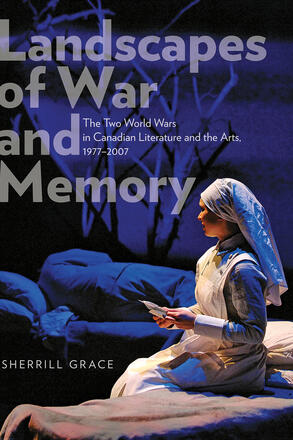
Landscapes of War and Memory
The Two World Wars in Canadian Literature and the Arts, 1977-2007
Description
"That Canada remains a society haunted by its war history seems clear."
Since 1977, a new generation of Canadian writers and artists has been mapping the cultural landscapes formed by the memories of war we have inherited, and also the ones we are expected to forget. Challenging, even painful, the art and literature in Grace's magisterial study build causeways into history, connecting us to trials and traumas many Canadians have never known but that haunt society in subtle and compelling ways. A contemporary scholar of the period under examination, Grace exemplifies her role as witness, investing the text with personal, often lyrical, responses as a way of enacting this crucial memory-work. This comprehensive study is intended for scholars, students, and general readers interested in literature, theatre, and art relating to memories of the world wars.
Reviews
“[The prominent Canadian literary critic Sherrill] Grace’s new book is an exhaustive look at the way Canadian artists have recently understood and remembered both wars. Her work is nuanced, probing the contradictions and ambiguities of the ‘good’ war, particularly through Joy Kogawa’s Obasan. Grace regularly returns to the theme of democracy and freedom being ‘fragile,’ especially during wartime. She also asks crucial questions using the metaphor of memory as landscape.” [Full post at http://bit.ly/1FIEST8]
- Jamie Swift
"... officialdom and media have celebrated wartime exploit as a central fixture of the Canadian experience. This is factually dubious but worthy of thoughtful analysis. Professor Sherrill Grace, a professor of literature at the University of British Columbia, examines the phenomenon. The result is striking and poignant.... Prof. Grace examines this ritual of remembrance over a 30-year period, citing hundreds of Canadian poems and films, novels, memoirs and documentaries." [Full review at http://bit.ly/1uiwGSg]
- Holly Doan
Remembering and forgetting are given equal focus as Grace encourages the reader to engage with the past and to consider the question posed by Frederick Varley in his famous painting of 1918, For What?.... Landscapes of War and Memory is intended for scholars, students, and all interested in literature, theatre, and art that addresses the memories of the two world wars. Elegantly written, beautifully illustrated, with copious notes and a detailed bibliography, Grace’s comprehensive study is a scholarly achievement of considerable magnitude.”
- Jane Mattisson Ekstam
"[Sherrill Grace's book] examines the work of artists, who can be instrumental in voicing and depicting war memories that are painful, sometimes heroic, and often shocking...Blending raw personal point of view with objective academic discourse, Grace describes how she was propelled into writing this book.... Landscapes of War and Memory is a compelling and provocative cultural study that poses important questions regarding where Canada stands today in relation to war." June-July 2015
- Anne Cimon
"An extraordinary and seminal work of truly impressive and seminal scholarship.... [E]specially recommended for academic library Canadian History reference collections and supplemental studies reading lists."
- Michael Dunford
"Despite the passage of five decades, Canadian novelists, memoirists, playwrights and artists are decidedly far from finished with the World Wars—with the experiences of our predecessors in battle and the sometimes atrocious actions of citizens on the home front. In particular, UBC literature scholar Sherrill Grace argues, we are concerned with memory, with remembering and forgetting... 'Forgetting is a trap,' she shows us. Art, then, does the vital memory work of 'bearing witness' to our troubled and restless war-scarred past.
- Naomi K. Lewis
In Landscapes of War and Memory, Sherrill Grace examines the twin processes of commemoration and amnesia that have shaped cultural responses in Canada to the two global conflicts of the twentieth century. Her study, immensely rich, surveys works of theatre, visual art, and film as well as novels and stories, but above all it is concerned with fiction in a catholic sense -- with the perpetual reinvention of the past.... I cannot do justice in a brief review to the six hundred pages of her book, and in summary I suggest only that it is a pleasure to read despite the sobering topic: Grace is an admirably clear writer, her study perfectly accessible. It will appeal to specialist readers of this journal as well as to students of Canada at large." [full review available at http://bit.ly/216Zr43]
- Nicholas Bradley
"This is a passionately written academic book – a characterization which the author would probably agree should not be an oxymoron. The passion suggests that it is written as much for curious general readers as for academics. I hope it reaches many of both, particularly those who know or have known war survivors.... Grace’s specific subjects are Canadian literary and visual representations of 20th-century war created in the 1977-2007 period, and the tasks of collective national memory that these perform.... Official war histories record the losses, gains, and casualties but seldom the savage and often impulsive and unnecessary means by which these came about. In these 600+ pages Grace examines numerous novels, plays and television films..." [Full post at http://bit.ly/1xCVoAn]
- Frank Davey